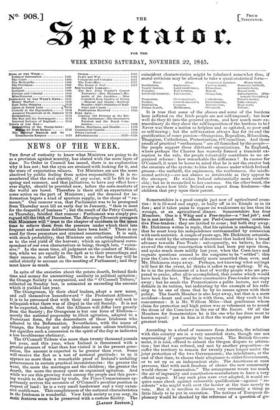Somersetshire is a good sample just now of agricultural coun-
ties: it is ill-used and angry, as badly off in its friends as in its foes ; and it takes pains to expose its weaknesses no less than its wrongs, at an agricultural dinner. Somersetshire has four Members. One is a Whig and a Free-trader—a " badjob"; and he is not invited. Two others are Peel-Conservatives, construc- tive Free-traders : they are invited to come; but both . stay away. Mr. Dickinson writes in reply, that his opinion is uhohaiaged, but that he must keep his independence untrammelled • by connexion
with such societies. A couple of years ago, Mr. Dickinson astonish- ed the world by the utterance of doctrines that looked like a broad' advance towards Free Trade : subsequently, we believe, he dis- avowed the strong construction which had been put upon them, and spoke much more mildly last year, when the Corn-laws and cognate questions seemed to the sanguine to be " settled": this year the Corn-laws are evidently more unsettled than ever, and Mr. Dickinson stays away. Perhaps, not knowing what sayings will best fit the event, he thinks it safest to say nothing. If so, he is in the predicament of a host of worthy people who are pre- pared to praise, after all is accomplished, that course which would. have been the best. The other constructive Free-trader also stays away ; but he sends the Protectionists a polite lecture, not very definite in its tuition, but indicating by the example of his refu- sing to be one of them that he by no means agrees with their policy. The fourth Member is also kept away, but that is a mere accident—heart and soul he is with them, and they exult in his concurrence : it is Mr. William Miles—that gentleman whose claim for protection and high prices was so vehement as to sound the doom of the Corn-laws in the ear of Mr. Escott. Of all the Members for Somersetshire he is the one who has done most to hasten repeal: yet in him is it that the worthy squires put the greatest trust.


























